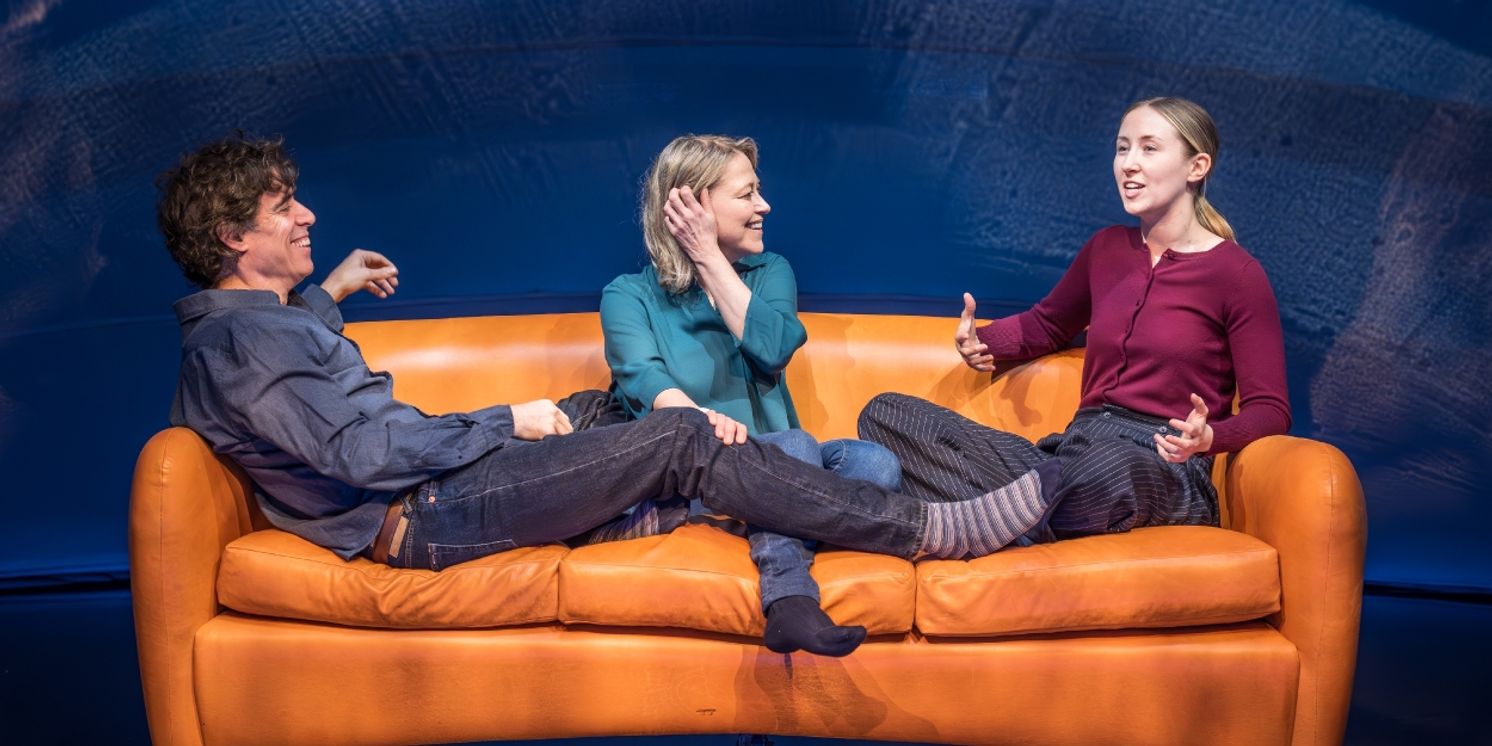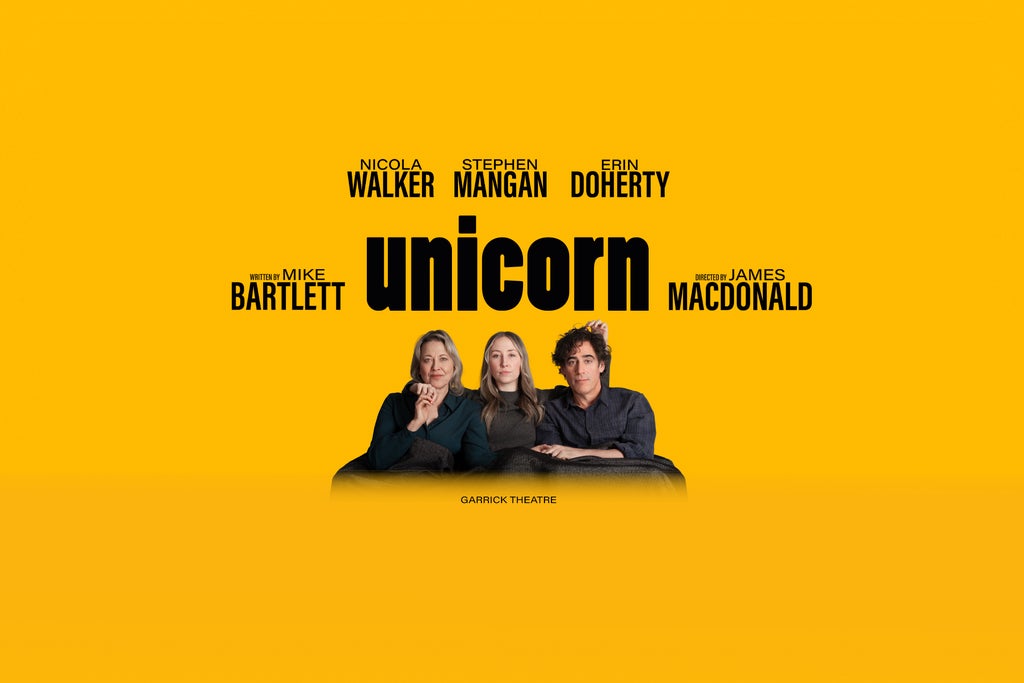Review Roundup: Mike Bartlett's UNICORN Canters Into The West End
Nicola Walker, Stephen Mangan and Erin Doherty star in the new play

Polly and Nick have it all. Happily married, two children, successful careers. And yet there's something missing... something rare and unforeseen…waiting to add a much-needed sparkle…
Unicorn is Mike Bartlett's explicit, funny and provocative new play, directed by James Macdonald, starring Nicola Walker (Unforgotten, The Split), Stephen Mangan (The Split, Episodes) and Erin Doherty (The Crown, Chloe).
What did the critics think?
Unicorn is at the Garrick Theatre until 26 April
Photo credit: Marc Brenner
![]() Aliya Al-Hassan, BroadwayWorld: The word unicorn is often used to describe the rarity of a woman who joins a heterosexual couple in a relationship, but also can be seen as describing the unrealistic and mythical expectations of polyamory. And this is where the play really stutters in the second half. The realities of being in a throuple are never explored, beyond an incredibly idealistic portrayal. We hear references to the climate crisis, politics and masculinity, but where are the power dynamics, the jealousy, the etiquette? As the lights go to black there is a distinct feeling that Bartlett didn't know how to end his story.
Aliya Al-Hassan, BroadwayWorld: The word unicorn is often used to describe the rarity of a woman who joins a heterosexual couple in a relationship, but also can be seen as describing the unrealistic and mythical expectations of polyamory. And this is where the play really stutters in the second half. The realities of being in a throuple are never explored, beyond an incredibly idealistic portrayal. We hear references to the climate crisis, politics and masculinity, but where are the power dynamics, the jealousy, the etiquette? As the lights go to black there is a distinct feeling that Bartlett didn't know how to end his story.
![]() Arifa Akbar, The Guardian: The performances lift it, somewhat. There is a natural ease between Walker and Mangan: she is volubly frustrated, he is hangdog. They are best when the laughter drops off and the intensity is raised but this is not often enough. Doherty brings spirit and comedy. But their relationships are peculiarly devoid of passion, too declarative of their desires. However intimate the conversation becomes, the chemistry in this throuple never quite ignites.
Arifa Akbar, The Guardian: The performances lift it, somewhat. There is a natural ease between Walker and Mangan: she is volubly frustrated, he is hangdog. They are best when the laughter drops off and the intensity is raised but this is not often enough. Doherty brings spirit and comedy. But their relationships are peculiarly devoid of passion, too declarative of their desires. However intimate the conversation becomes, the chemistry in this throuple never quite ignites.
![]() Sarah Crompton, WhatsOnStage: With the help of James Macdonald’s unobtrusive but taut direction, the cast excel. There are few people better than Mangan at making the words “in theory” feel like an essay in probability; as he wriggles and writhes in the midst of an unfamiliar situation, he brilliantly suggests a genuine confusion that masks something darker and less savoury. Walker is equally powerful, often funny, always honest. Her character is the ultimate truth-sayer, but she’s good at revealing the cost of that – showing the doubts beneath her desire to bring about change.
Sarah Crompton, WhatsOnStage: With the help of James Macdonald’s unobtrusive but taut direction, the cast excel. There are few people better than Mangan at making the words “in theory” feel like an essay in probability; as he wriggles and writhes in the midst of an unfamiliar situation, he brilliantly suggests a genuine confusion that masks something darker and less savoury. Walker is equally powerful, often funny, always honest. Her character is the ultimate truth-sayer, but she’s good at revealing the cost of that – showing the doubts beneath her desire to bring about change.
![]() Clive Davis, The Times: There’s lots of explicit talk about goings-on in the boudoir — the language is very blunt at times. But watching Stephen Mangan, Nicola Walker and Erin Doherty exchange a mix of crude banter and philosophical profundities on the implications of a threesome — or “throuple”, if you prefer — is a little like wandering around a giant erotic emporium on an industrial estate. After the twelfth box of vibrators starts buzzing away, a certain boredom sets in.
Clive Davis, The Times: There’s lots of explicit talk about goings-on in the boudoir — the language is very blunt at times. But watching Stephen Mangan, Nicola Walker and Erin Doherty exchange a mix of crude banter and philosophical profundities on the implications of a threesome — or “throuple”, if you prefer — is a little like wandering around a giant erotic emporium on an industrial estate. After the twelfth box of vibrators starts buzzing away, a certain boredom sets in.
![]() Sam Marlowe, The Stage: The conversations on which we eavesdrop are thoughtful and spikily funny, and Bartlett adroitly tweaks the balance of power as circumstances bend the relationships into unexpected shapes, as well as questioning which conventional impulses would creep into the most assiduously progressive set-up. Yet the stakes never feel high enough. It’s all so considered, so measured and cerebral, and although Kate in particular keeps talking about fun, that’s the very last thing anything represented here looks like.
Sam Marlowe, The Stage: The conversations on which we eavesdrop are thoughtful and spikily funny, and Bartlett adroitly tweaks the balance of power as circumstances bend the relationships into unexpected shapes, as well as questioning which conventional impulses would creep into the most assiduously progressive set-up. Yet the stakes never feel high enough. It’s all so considered, so measured and cerebral, and although Kate in particular keeps talking about fun, that’s the very last thing anything represented here looks like.
![]() Marianka Swain, London Theatre: Bartlett provocatively poses the thesis that it’s surely better to share and do so honestly than to betray your spouse with lies and secret infidelity. There’s a split in generational attitudes here, with Kate calmly open to new ideas, although Polly also gets a wistful speech about pre-internet romance. Opening the night before Valentine’s Day, this promises to spark heated post-show discussions about contemporary relationships.
Marianka Swain, London Theatre: Bartlett provocatively poses the thesis that it’s surely better to share and do so honestly than to betray your spouse with lies and secret infidelity. There’s a split in generational attitudes here, with Kate calmly open to new ideas, although Polly also gets a wistful speech about pre-internet romance. Opening the night before Valentine’s Day, this promises to spark heated post-show discussions about contemporary relationships.
![]() Patrick Marmion, Daily Mail: James Macdonald’s production looks slick, behind a neon arch which forms the edge of a Sydney Opera House shell fitted with a succession of furnishings — sofa, bench, bed etc. Setting up a curious yarn, it’s quite cute and rather long-winded in its cosy anguish. But for all its fearless talk about sex and relationship fluidity, it heads towards a mushy, sentimental end that not all viewers will find intriguing.
Patrick Marmion, Daily Mail: James Macdonald’s production looks slick, behind a neon arch which forms the edge of a Sydney Opera House shell fitted with a succession of furnishings — sofa, bench, bed etc. Setting up a curious yarn, it’s quite cute and rather long-winded in its cosy anguish. But for all its fearless talk about sex and relationship fluidity, it heads towards a mushy, sentimental end that not all viewers will find intriguing.
![]() Nick Curtis, The Standard: It's slickly directed by James Macdonald on a set distractingly dominated by a ribbed half-dome that sometimes contracts like a concertina and otherwise acts as a backdrop for garish shadows. Scene changes are accompanied by snatches of the music hall song Daisy, Daisy – a hymn to coupledom involving “a bicycle made for two”, which was changed to “a bisexual” in my school playground. Though the play has flaws, and falls apart completely at the end, it’s never less than a rollicking, stimulating ride. If you’ll pardon the expression.
Nick Curtis, The Standard: It's slickly directed by James Macdonald on a set distractingly dominated by a ribbed half-dome that sometimes contracts like a concertina and otherwise acts as a backdrop for garish shadows. Scene changes are accompanied by snatches of the music hall song Daisy, Daisy – a hymn to coupledom involving “a bicycle made for two”, which was changed to “a bisexual” in my school playground. Though the play has flaws, and falls apart completely at the end, it’s never less than a rollicking, stimulating ride. If you’ll pardon the expression.
Average Rating: 53.8%
- To read more reviews, click here!
- Discuss the show on the BroadwayWorld Forum



